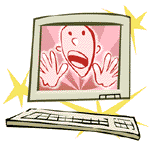Trapped on the Web: Internet Addiction Disorder
It is an understatement to say that the internet has changed the way we communicate. We turn to our computers in search of information and e-mail friends rather than pick up the phone. Some of us shop online while others spend hours reading blogs, playing games, or even searching for romance online. If you click around long enough, you might even stumble across an Internet addiction quiz. Could you have a problem?
A Result of Computerized Life
A number of psychologists and other medical specialists have claimed that certain people really are at risk for computer overuse.
Dr. Ivan Goldberg, a New York Citypsychiatrist, has coined a term for this problem, calling it Internet addiction disorder. He claims that victims of this disorder are growing as our culture becomes more and more dependent on the computer, not only through work that is ever more computer focused, but also through socializing that is increasingly computer mediated.
Priscilla C., in fact, met her current boyfriend through an online card game in a chat room. “I am not sure how you get attracted to someone over the computer, but that is how our relationship started,” she says.
John D., a computer technician, also spends many hours online playing computer games at work and connecting with various people through instant messaging. “In my role as tech support, there is a lot of downtime when we are just waiting for someone to call for help. Having the computer around really helps with those slow moments.” While neither Priscilla nor John has a problem, both use the computer to supplement face-to-face relationships rather than replace them. There are others who use the computer to avoid human contact or their responsibilities.
When the Computer Takes Control
 Dr. Maressa Hecht Orzack, PhD, founded the Computer Addiction Services atMcLeanHospitalinBelmont,Massachusetts. She became concerned after discussing the issue with colleagues who were treating more and more patients with complaints that involved computers—mothers who played computer games rather than caring for their children, unproductive employees, or seriously depressed adolescents who used the computer to find friends rather than risk interactions with real peers.
Dr. Maressa Hecht Orzack, PhD, founded the Computer Addiction Services atMcLeanHospitalinBelmont,Massachusetts. She became concerned after discussing the issue with colleagues who were treating more and more patients with complaints that involved computers—mothers who played computer games rather than caring for their children, unproductive employees, or seriously depressed adolescents who used the computer to find friends rather than risk interactions with real peers.
Orzack uses the various terms computer addiction, internet addictive disorder, or cyberaddiction to label abuses that can range from overuse of computer games, excessive monitoring of pornography sites, or simply staying online with little regard for the time.
Defining Computer Addiction
The following are the characteristics that Orzack uses to help define computer addiction in her program:
- Psychological symptoms:
- A sense of well-being at the computer and/or a sense of depression or emptiness when not at the computer
- Craving more and more time at the computer and an inability to control computer time
- Problems with job or school because of the time spent at the computer
- A lack of honesty about how much time is spent on the computer
- Ignoring family and friends
- Physical symptoms:
- Carpal tunnel syndrome
- Migraines
- Backaches
- Dry eyes
- Eating abnormalities
- Sleep disturbances
- Problems keeping up with personal hygiene
A Compound Problem
Internet addiction disorder is often linked with depression or attention deficit disorder (ADD), and many people are seeking help for another condition when they are diagnosed. Dr. Kimberly Young, executive director at the Center for On-Line Addiction, has been studying the phenomenon since 1994. She reports that a previous addiction or emotional problem is often evident with people that suffer from computer over-usage.
Treating the Addiction
As with any addictive pattern, Dr. Orzack stresses that patients have the ability to control their own behavior if they so desire. “If a patient wants to change,” she says, “they will, and my job is to help them to see the parts of their behaviors that they are willing to change.”
Moderation, Control and Time Management
Young uses a program that is similar to that used with food addiction, stressing moderation and controlled use as a form of primary treatment. She also suggests using time management strategies to help them discontinue their abuse. Says Young, “I have also recommended spiritual healing, such as the 12-step program used by Alcoholics Anonymous or pastoral counseling.”
Behavior Modification
The evaluation methods atMcLeaninclude standard measures for stress, impulse control and anxiety, and depression, as well as parameters designed specially to measure computer addiction. Orzack’s preferred treatment is cognitive behavior therapy, a therapeutic method that allows the patient to identify the problem, take an active role in determining the solutions, and relearn skills.
If you feel that your computer use is negatively impacting your life, talk to your doctor or a therapist. There is help available.
REFERENCES:
Computer Addiction Services website.
Internet addiction. Helpguide.org website.





